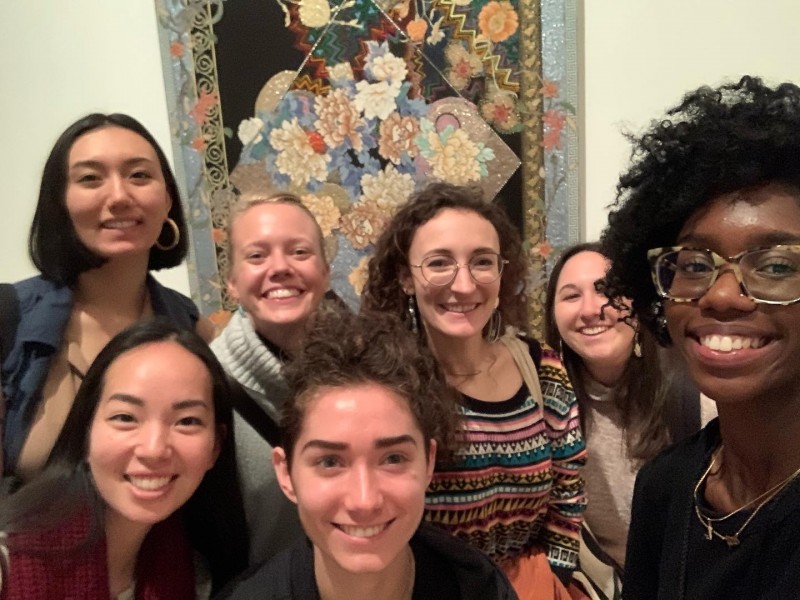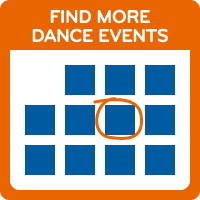Junior Committee
Friday, April 10, 2020
Reflections on Leadership: Conversations as Power
 Photo by Jenée-Daria Strand
Photo by Jenée-Daria Strand
Since last summer, I’ve had the incredible honor of leading Dance/NYC’s Junior Committee (JComm) alongside the brilliant Kimberleigh Costanzo. When we found out we would be co-chairs of JComm, we wanted to interrogate ways that things had been done in the past and implement new organization and facilitation techniques to create a deeper sense of ownership and leadership for everyone on the committee.
Using adrienne maree brown’s Emergent Strategy: Shaping Change, Changing Worlds as our guiding text in facilitation, we wanted to focus on the importance of conversations -- the ones that could only happen with these people in the room. If you know anyone on JComm, then you know that the people we have in the room are all incredibly thoughtful individuals. I can barely resist the temptation to say our meetings are in the room where it happens (or the virtual room).
What Conversations Are We Having?
Before we started our official meetings, Kimberleigh and I had one-on-one meetings with all members to get a sense of their expectations for the committee, topics they wanted to learn more about, and what expertise they could share with the group. (The idea to meet with everyone individually stemmed from the leadership of Kristina Newman Scott, who met with all of the employees at BRIC when she became its president.
In our first meeting, we did an activity that we named “The Spectrum of Ideas,” where we had everyone gather in an open space of the conference room and move around the room based on their knowledge of an idea (that came up in our one-on-one conversations). At an early virtual meeting, we had each member speak about topics they were interested in, while their accountability partner took notes in a google doc (h/t Kimberleigh!). Everyone else could then comment on and highlight ideas that resonated with them.
We know that we can’t cover everything, so we are constantly looking back at this google doc, past Meeting Minutes, and the car park (the "car park" or “parking lot” is an ongoing list of topics we want to discuss, collected in real time and constantly being added to; it allows us to press pause on a conversation we don't have time for in the moment, without dismissing it. If publicly accessible, as ours is to all members, it's a great accountability tool) for topics to which we should return. We recently held a case study discussion on microaggressions, which was one of the most highlighted ideas from our early google doc activity.
How Are We Making Time For Conversations?
We make time by not assigning time. That may sound counterintuitive, but we’ve prioritized having engaging conversations over checking off items on the agenda. To do that, we’ve started using what we term “Meeting Maps.” Similar to graphic facilitation, these maps are a mix of words and graphics that explain what we will cover in a meeting. These can be free-flowing, top to bottom, left to right, zig-zagging across a page. It has helped us move away from strict structures and linear thinking, which lets our meeting flow more naturally. In many cases, instead of assigned timing to different sections, Kimberleigh and I will determine when a conversation comes to a natural end, rather than cutting off a discussion.
Plus, we are artists! It’s fun to creatively express what we will cover in meetings. We open it up to members to volunteer to be the “Cartographer” for the meeting, which includes creation of the meeting map and the presentation of a land acknowledgment (or less formal opportunity to honor the land we are on).
How Are We Holding Conversations during COVID19?
It’s an understatement to say there’s a lot going on right now. We understand that not everyone wants to be inundated with the harsh reality and negativity surrounding COVID19. But we also understand that people need space to share their experiences, their emotions, and to offer resources. The topics of COVID19 and quarantine are unavoidable, but we try our best to mitigate it by offering the first fifteen minutes as an optional time to focus on responses to the pandemic. This gives members an opportunity to take a step back from such a focused discussion if they want/need that space.
How Are We Turning Conversations Into Action?
Some of these discussion topics inherently produce advice that we are able to enact in our own lives. In one meeting, we discussed questions from Emergent Strategy and shared techniques we each use to create personal and organizational (nonlinear) change/growth. In small ways, we are bringing these conversations to life by integrating things we learn from each other into how we navigate our professional and personal trajectories.
Do you value small scale growth and change? Do you adapt easily to new circumstances? Are you comfortable with nonlinear growth? Do you experience conflict as a generative force in your life and work? Are you in community/Relationship with people who can and do hold you accountable? Do you see change as an opportunity? Do you see yourself as part of the natural world?
A personal example: we’ve spoken frequently about prioritizing mental health, and what that looks like within the dance field. I’ve been so inspired and comforted by the openness with which folks have shared their experiences. JComm members might not have known how much these conversations felt like enough support for me to take a step for my own growth. I started therapy last week.
A macro example: we’ve been taking one of our conversations “on tour.” Last year’s Symposium session “Words We Use to Talk About Race” was also held at the Arts Administrators of Color Convening in Washington, DC. One of my colleagues serves on the Board of the organization and when the call for proposals came out, I immediately forwarded it on to our Symposium team. Check out their blog post on the panel here.
Final Thoughts
Through JComm, I have learned an incredible amount about the structures within which we live and work, and how members navigate and tear down those forms. I’m very lucky to work with such remarkable and thoughtful individuals and have the opportunity to harness the collective wisdom of the group. As an Asian-American woman in the arts, I’m familiar with being the only POC in the room. To have access to this network of folks who want to discuss ways we can push the field towards equity and keep me accountable has been amazing.
And as adrienne maree brown says, “small is all.” We are all fractals, who can make larger, lasting changes within the arts. Everytime we have a conversation, we are teaching each other and preparing ourselves to take that knowledge into our workplaces and our homes. It’s a very exciting idea to remember!
Any questions about our leadership style and focus on generating engaging conversations? We’re happy to have that conversation.

